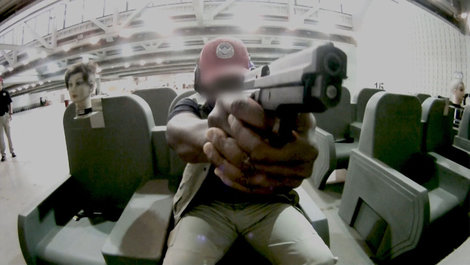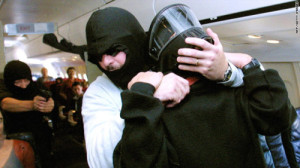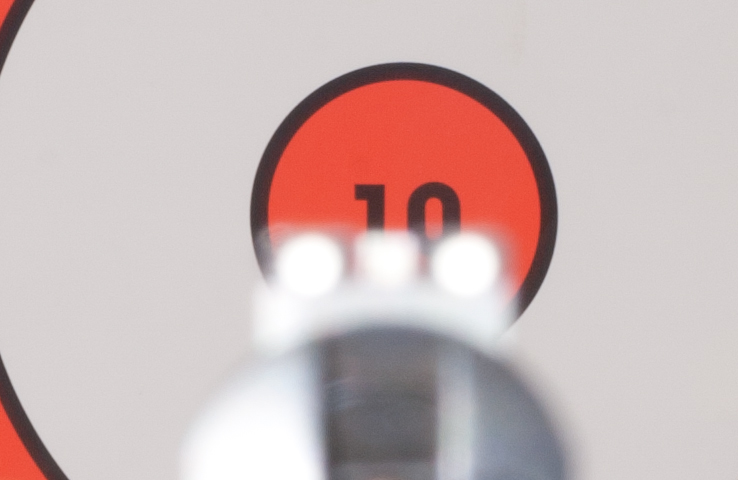
Heart Of Bronze – Deputy Nick Worthy
[su_heading size=”27″ margin=”0″]Bronze Medal Deputy – Nick Worthy[/su_heading]
Interview by Troy Taysom • Photographs provided by Nick Worthy

- Meet Nick Worthy, currently a road patrol deputy for the Brevard County Sheriff’s Department in Florida and also an Army Ranger. Worthy is a Bronze Medal of Valor recipient for his bravery and actions while on patrol in Afghanistan (above) in 2010. The American Shooting Journal is honored to have this exclusive interview.
[su_dropcap style=”light”]N[/su_dropcap]ick Worthy grew up in a child’s paradise; his hometown of Satellite Beach is located on Florida’s eastern shore on a strip of land a mile wide, bordered by the Banana River to the west and the Atlantic Ocean to the east. Worthy’s high school is literally across the street from the beach, making attendance difficult, especially when the waves were big. I know from personal experience, as I too lived in Satellite Beach during my formative years. Satellite Beach has the feel of a very small town and is a peaceful and fun place to grow up. Watersports abound, from surfing to scuba diving, water skiing to sailing and, of course, excellent fishing. The beach is never more than a 10-minute walk or five-minute drive.
Worthy, now a deputy sheriff in Brevard County (where Satellite Beach is located), grew up doing what kids in small beach towns do – surf. When Worthy wasn’t surfing, he was wrestling for his high school.
Immediately after graduation, Worthy enlisted in the United States Army on a Ranger track and was assigned to Charlie Company 1/75th Rangers. He attended Ranger School a year later. Ranger School consists of 60 days of sleep deprivation and stress-induced missions. Each mission forces the Ranger candidate to think critically under less-than-ideal situations. The school has three phases, each more difficult than the last. The beginning phase takes place at Camp Darby, Fort Benning, Ga., followed by mountain training at Camp Merrill in Dahlonega, Ga., and culminates in the Florida Phase at Camp Rudder and Eglin Air Force Base. The graduation rate hovers around 50 percent or lower, and most have to start over at least once during the course. Worthy completed the course the first time through.
After earning his Ranger tab, Worthy went back to Charlie Company and began working his way through the ranks. He started out as a rifleman and advanced to grenadier, M249 Gunner, M240 Gunner and finished his enlistment as an E-5 sergeant team leader. Worthy found that his favorite weapon system was the MK 48, a light belt-fed machine gun chambered in the hard hitting 7.62x51mm. Worthy told me, “[The MK 48] is an amazingly lethal weapon that saved the lives of many fellow Rangers and prevented the enemy from advancing on us almost instantly.”
 During his 2010 deployment to Afghanistan Worthy was involved in an operation that placed he and 30 fellow Rangers in harm’s way. Although the details remain classified it’s easy to surmise that Worthy and his fellow Rangers were doing what they do best – looking for and eliminating bad guys. As is usually the case with special ops units, they were deep in Taliban territory and undoubtedly being watched by the enemy as they made their way through the rugged countryside. Soon they found themselves surrounded by 100-plus Taliban fighters. Their squad leader dead, Worthy and his fellow Rangers fought their way out. Worthy told me that he didn’t do anything differently than any of the other Rangers, but his superiors didn’t see it that way and rewarded him with the Bronze Star Medal with a V for valor in combat. It’s a classification for heroism.
During his 2010 deployment to Afghanistan Worthy was involved in an operation that placed he and 30 fellow Rangers in harm’s way. Although the details remain classified it’s easy to surmise that Worthy and his fellow Rangers were doing what they do best – looking for and eliminating bad guys. As is usually the case with special ops units, they were deep in Taliban territory and undoubtedly being watched by the enemy as they made their way through the rugged countryside. Soon they found themselves surrounded by 100-plus Taliban fighters. Their squad leader dead, Worthy and his fellow Rangers fought their way out. Worthy told me that he didn’t do anything differently than any of the other Rangers, but his superiors didn’t see it that way and rewarded him with the Bronze Star Medal with a V for valor in combat. It’s a classification for heroism.
As Worthy’s enlistment came to an end he followed his father’s example and also became a road patrol deputy for the Brevard County Sheriff’s Office where his dad has been a deputy for some 30-odd years. The transition from service to his country to service to his community was a natural one for him.
As I spoke with Worthy it was apparent to me that he is a humble, quiet man who didn’t want to talk about himself more than he had to. When I asked him if there was a seminal moment when he knew he had made the correct choice in becoming an officer, he told me he couldn’t think of one, but promised to think on it and email me later. He did as he promised and emailed me a story. That he would rather email the story than say it out loud demonstrates his humility. Here’s the story in his own words:
 “I responded to a trespass call at a local gas station. The clerks advised that a homeless male was loitering on the property and they wanted him to leave. When I arrived the man began to pack his things and said ‘You must be here for me. I didn’t mean to bother anyone; I was just trying to stay warm.’ I decided to stay there and talk to him about his situation. It turns out the man wasn’t asking for money. He only wanted to get into one of the local shelters; however, his ID card was stolen, and he stated that the shelter will not accept anyone without an ID. As the male looked down and proceeded to walk towards his bicycle I told him I had to go back to the precinct right quick but wanted him to meet me at the Subway [sandwich shop]. When I met back up with him I gave him an unofficial record of his ID card that was on record from a previous consensual encounter with another deputy. The man began to cry and told me that nobody has ever gone out of their way like that to help him, especially the police. Since he was too proud to accept any cash for a sandwich I gave the money to the cashier to make him one when he came inside. I wished him luck and told him the cashier wanted to ask him a question as I left in my patrol car.”
“I responded to a trespass call at a local gas station. The clerks advised that a homeless male was loitering on the property and they wanted him to leave. When I arrived the man began to pack his things and said ‘You must be here for me. I didn’t mean to bother anyone; I was just trying to stay warm.’ I decided to stay there and talk to him about his situation. It turns out the man wasn’t asking for money. He only wanted to get into one of the local shelters; however, his ID card was stolen, and he stated that the shelter will not accept anyone without an ID. As the male looked down and proceeded to walk towards his bicycle I told him I had to go back to the precinct right quick but wanted him to meet me at the Subway [sandwich shop]. When I met back up with him I gave him an unofficial record of his ID card that was on record from a previous consensual encounter with another deputy. The man began to cry and told me that nobody has ever gone out of their way like that to help him, especially the police. Since he was too proud to accept any cash for a sandwich I gave the money to the cashier to make him one when he came inside. I wished him luck and told him the cashier wanted to ask him a question as I left in my patrol car.”
Singer Don Henley released a song in the 1980s entitled “Dirty Laundry.” The song is about how much the news media loves tragedy, pain and suffering. One line in the song says, “I make my living off the evening news, just give me something, something I can use. People love it when you lose … ”

- Most cops are humble protectors of our communities who perform daily acts of kindness, never expecting or wanting thanks or recognition. Here, Worthy (right) is on bike patrol by John Decossaux and Corey Bertini.
The song’s lyrics are almost prophetic in describing today’s news reporting. Stories of murder and mayhem abound, and the volume is cranked to 11 if the story involves a cop. There is no shortage of news stories casting cops in a bad light, but what you rarely see are stories like the one Worthy shared with me. My bet is that he hasn’t shared that story with anyone besides maybe his fiancee.
Worthy could have just as easily sent the homeless man on his way without trying to help him out. My experience has been that people who witness war and all its tragic occurrences like Worthy has usually end up one of two ways: 1) callous and uncaring about other people and their problems; or 2) they vow to alleviate as much suffering in the world as they can. It is obvious which path Worthy has taken.
Regrettably, not all calls end in a positive way. Monday, March 9, 2015, was a defining date in the young life of Deputy Worthy. At 9:08 p.m. a 911 call was fielded describing a man standing in the street firing a handgun at random cars and houses. The house from where the 911 call originated was occupied not only by adults but by children as well. The City of Cocoa was the primary agency responding to the call, with Deputy Worthy responding as back-up. It turned out that he was the closest officer and arrived first.
When he got within two blocks of where the shooter had last been seen he stopped to retrieve his Colt AR-15 patrol rifle and approached on foot. His time as a Ranger had taught him that the element of surprise was worth its weight in gold, but like all well thought-out plans his was subjected to Murphy’s Law. The original plan went by the wayside within seconds of his arrival.
Worthy’s car was blacked out, meaning no lights of any kind were on, when he saw a man standing in the street. Worthy turned on his headlights to get a better look at the man. The man, who turned out to be the active shooter, acted as if he was going to run, so Worthy activated his blue lights announcing that he was a deputy sheriff. As soon as the lights came on the suspect reached into his pocket, pulled out a handgun and began firing at him.
One of the first shots came through the patrol car’s windshield and embedded in the headrest, narrowly missing Worthy’s head. Worthy exited and sought better cover behind his car. The shooter, in a highly agitated state, pursued Worthy to the rear of the car, shooting the entire time. At one point the suspect, later identified as 30-year-old Cedrick Bishop, was running towards Worthy and it was at this time that Worthy confronted the suspect and killed him. Worthy’s experiences in Southwest Asia saved his life that night.
Worthy was fighting for more than the lives of the residents in that small Florida town; he was fighting for his future. His fiancée, who was nine months pregnant with their daughter, and her young son were at home. If it were not for his quick response you may very well have been reading his obituary and that of several citizens of Cocoa instead of this article.
As Worthy and I were talking about the shooting he told me that taking a life is never a good thing. I agree, but the decision to take a life that night had already been made and not by him. The active shooter had decided that someone was going to die and ultimately made the decision that it would be him.

- When Worthy isn’t on duty, he spends time with his stepson, newborn daughter and fiancée (left) Rachel Trexler. He takes his family camping and passes on some of his Ranger skills, such as knot tying, making a good shelter and finding food and water to his little buddy. He also likes to snowboarding in the mountains of North Carolina.
It was a privilege for me to interview Worthy. Something that struck me while speaking with him was his desire to deflect credit away from himself and give it to others. He did this when I asked him about his heroic efforts in Afghanistan, and on March 9, 2015. But isn’t this what real heroes do? This modesty is what confirmed it for me. As a father of three boys I can imagine how proud Worthy’s parents are of him. As a citizen I know how proud we are of him. As a son I know how proud his kids will be of him when they are old enough to know what their dad has done in the name of service.
In this age of overpaid, overindulged athletes, entertainers, and other public figures, it is refreshing to know that people of character are out there. These quiet men and women go about their jobs every day never seeking the limelight or fame. They go to work with the singular goal of protecting the citizens in their jurisdiction no matter the cost. These officers deserve our gratitude and support for their willingness to sacrifice all so that we can be safe.
Worthy said it best: “I did what any other law enforcement officer would have done; I just happened to get there first.” What Worthy doesn’t say is that when the shots first ring out, he and his fellow officers (and soldiers) run towards the danger, not away from it, all to protect their citizens. ASJ

- After completing basic training, AIT and jump school, Worthy attended Ranger Indoctrination. This is a tough course designed to weed out soldiers from the ranks of potential Rangers. Worthy passed the course and was assigned to Charlie Company 1/75th Rangers. A year later Worthy attended Ranger School.



